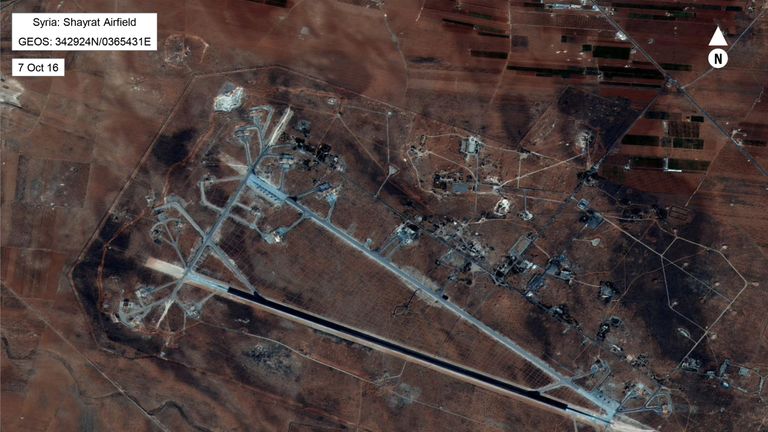Missile attack report was a 'false alarm' - Syrian state TV
State TV had earlier claimed missiles had targeted two airbases in Homs and Damascus, in what it called "a new "aggression".
Tuesday 17 April 2018 11:33, UK
There is confusion over reported airstrikes on Syria after Syrian state TV said a "false alarm" set off the country's air defences early on Tuesday morning.
Quoting an unnamed military official, state TV said air defences fired a number of missiles due to a "false alarm", but gave no more information.
Earlier, the same outlet claimed missiles had targeted two airbases - at Shayrat in Homs province and Dumair military airport, northeast of Damascus in overnight raids.
State TV said the country's air defences had confronted a new "aggression" but gave no further details, prompting the US to say its military was not involved.
Shayrat was hit last year by US cruise missiles, launched in response to a chemical attack that killed at least 70 people in the rebel-held town of Khan Sheikhoun.
Dumair is used by Syria's military to support the campaign against rebels in eastern Ghouta.
It comes just days after the UK, US and France launched airstrikes on three targets following the latest alleged chemical attack by the Syrian regime in Douma.
But US Pentagon spokeswoman Heather Babb said: "There are no US or coalition operations in that area."
There had been speculation that Israel launched the strikes.
An Israeli military spokesman said: "We don't comment on such reports."
Israel's main concern in Syria is the growing influence of Iran, which it says supplies weapons to Hezbollah from inside the country.
Israel has struck Syrian military targets before and was blamed for strikes earlier this month on the T4 air base in Homs.
That attack killed four Iranian military personnel - but Israel did not confirm or deny involvement.
Moscow and Damascus claimed two Israeli fighter planes carried out that airstrike "remotely from Lebanese territory".
Russian foreign minister Sergei Lavrov described it as a "provocation" and a "very dangerous development".



